
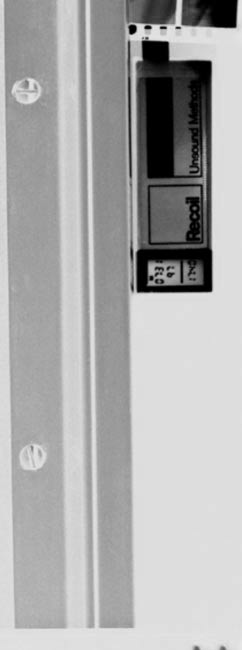

|
|
|||||||||||||||||||||||||||||
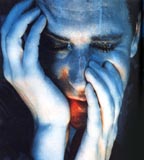 |
|||||||||||||||||||||||||||||
| Alan
Wilder is just about to release his third CD under the name of Recoil,
but you may know him better as the man who provided much of the Depeche
Mode sound between 1983 and 1995. Andy Jones joins him at Mute Records
to discuss the new album, the gear, the Mode, and the advantages of being
single
Future Music Magazine November 1997 |
|||||||||||||||||||||||||||||
|
Interview by Andy Jones "Demonic, vulnerable, medical, scary, evocative, obsessive, lonely, sensuous, tripnotic..." That's how Alan Wilder describes each of the tracks on his new album, Unsound Methods. It's how some critics have described Depeche Mode in the past which, if you think about it, isn't that surprising. Wilder was one of this world dominating foursome for well over a decade and helped sculpt some of their finest sonic moments. Some have said, myself included, that the last Depeche album lacked a little something, and it could be said that we have found it on Unsound Methods. Not that this recording sounds much like Depeche Mode - in fact, it's pretty unlike anything you may have heard, previous Recoil stuff included. Wilder has woven some pretty scary textures together and given the whole thing a hefty 90's kick up the arse with some super beats and vocals supplied by a fine and diverse bunch, including a New York poet and the ex-singer of Nitzer Ebb. Tripriotic is indeed perhaps the best way of describing something like Unsound Methods. A new word to describe the indescribable. Even Mr. Wilder himself was unsure of how this latest Recoil offering would sound.
|
|||||||||||||||||||||||||||||
| ' | "I don't think you ever know," he explains. "I never know until it's finished! Along the way you have all sorts of concepts and ideas. You think you know where you're going and then something happens or someone does something that turns it on its head again. So really you just keep an open mind and work instinctively as you go along. I work rather as a painter might. I just put something on a canvas and then that leads me to the next thing." | ' | |||||||||||||||||||||||||||
 |
 |
 |
|||||||||||||||||||||||||||
|
|
|
|
|
||||||||||||||||||||||||||
| One
advantage that Alan Wilder has is his access to a wide range of vocalists
who temporarily join the Recoil fold. On the last album, Bloodline, Curve's
Toni Halliday, Nitzer Ebb's Douglas McCarthy and a certain Moby helped
out (Moby on the superb track 'Curse' and Halliday on 'Edge To Life' before
she went on to more Leftfield things). This time around Wilder began the
project unsure of whether artists would be involved at all.
|
|||||||||||||||||||||||||||||
| ' | "I started off doing something instrumental to see where it took me. It has retained the atmosphere but it became apparent that trying to complete the tracks as instrumentals wasn't going to stand up, and they'd need voices." | ' | |||||||||||||||||||||||||||
| Douglas McCarthy reappears on Unsound Methods, but the other three artists are less well known. A gospel singer, Hilda Campbell; a spoken word artist from New York, Maggie Estep; and another singer signed on the strength of a demo, Siobhan Lynch. | |||||||||||||||||||||||||||||
 |
 |
 |
|||||||||||||||||||||||||||
|
|
|
|
|||||||||||||||||||||||||||
| ' |
"I thought it would be more interesting to use different people" Wilder explains, "it brings a degree of tension working on something with someone you don't know. You have no idea what's going to happen. I think it's a gamble very much worth taking with everything to gain and nothing to lose. It could go horribly wrong, in which case you just part company and move on. However, if it does work you have the potential to get something really special you didn't expect, while simultaneously making new friends and colleagues in the process." I gave them a fairly free reign. I really didn't want to impose on them too much. I wanted them to bring whatever they felt was appropriate to the project, but within a framework. I obviously gave them tapes of the music and loose themes or directions but nothing more than that. It gave them something to focus on but also enough scope to do their own thing." |
' | |||||||||||||||||||||||||||
| The
new Recoil sound has a real late 90’s feel, largely due to the
breaks that accompany the vocalists described above. But nothing in Mr.
Wilder's life is intentional.
|
|||||||||||||||||||||||||||||
| "I think you are constantly influenced by what is around at the time, but again I wasn't trying to get a particular feel. I was simply employing aspects of music that I enjoy. I like a lot of the kind of groove-based music of people like Massive Attack and Portishead. That sort of influence is in there in some of the rhythms. But I also like completely different types of music as well. When I'm going through CDs in the shops I always end up in the soundtrack section. I listen to quite a wide cross section of styles and what I produce is just a reflection of these tastes." | |||||||||||||||||||||||||||||
| While
Unsound Methods retains some typical Alan Wilder moments, the overall sound
is quite a departure from Depeche Mode. Was this intentional?
|
|||||||||||||||||||||||||||||
| "I
don't think I was thinking about it that much," Alan replies. "I think
that maybe there was a conscious move to do something less electronic but
you utilize whatever you feel will work with the tune. If I thought something
electronic was appropriate, I would have used it. I try not to have too
many ground rules."
There are a few sequencer parts but from a rhythm point of view I wanted something that really grooves more. To program sleazy drum rhythms electronically, or to find 'that' groove is difficult. I do play drums myself but not particularly well. Most of these are sampled loops cut up and mutated quite radically from their original source."
|
|||||||||||||||||||||||||||||
| So what were the original sources? | |||||||||||||||||||||||||||||
| ' |
"There are all kinds of things really. I'm not sure whether I'm prepared In disclose them," he laughs. "I really just take sounds from wherever I can find them. There are various tapes that get passed around the industry that are full of drum loops and nothing else. I haven't got a clue where they come from and I couldn't even tell you if any of them are contentious. I also re-use sounds that we used with Depeche on occasion." |
' | 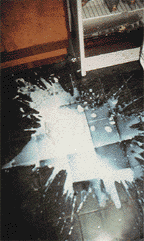 |
||||||||||||||||||||||||||
| These
sounds were particularly noticeable on Recoil's first EP, '1 + 2', which
Alan describes as him "just faffing around at home on a four-track cassette
and experimenting with samplers." And did we hear some Kraftwerk on there?
"Oh, I expect so," he jokes. "I wouldn't be surprised."
|
|||||||||||||||||||||||||||||
| Splitting
the Mode
While Recoil's output may be superb, it's hard to talk to Alan Wilder without asking about Depeche Mode. After all, he was with the band for many years. But after the rumours of a less than amicable split, you have to wonder whether the subject of Depeche Mode is a touchy one. Still, this is Future Music and we never hold back. But it's probably best to sidle into the subject with a less controversial question. Probably one about gear! Oh yes, here's one! So how was the gear split up when he left the band?
|
|||||||||||||||||||||||||||||
| "Well
most of the equipment was group owned and then there were items that were
individually owned," Alan explains. "I kept a few bits of group gear which
we split up in a fair way. I ended up with a drum kit, some keyboards and
a few other bits and pieces. Most of the equipment I now use is actually
my own. I have a studio at my home in Sussex ."
|
|||||||||||||||||||||||||||||
| So far so good. Ok, we might as well leap right in here with both feet. Why did he leave Depeche Mode? | |||||||||||||||||||||||||||||
 |
' | "At the time I left I put out a short statement explaining why. I did that because I thought it would be more succinct and more accurate and I could then close the lid on it and not have to deal with it again. But I'm not so naive to think that no one would ask again and there would never be any curiosity. The simple answer is that I'd just had enough of being in the group and I felt that I couldn't really do much more within the confines of the group. There were difficulties and communication breakdowns. | ' | ||||||||||||||||||||||||||
| It's
ultimately a much more simple reason: that I wanted change and wanted to
do something different. It was at a time in my life when I needed to clear
out a lot of baggage . I felt it was time to move on."
|
|||||||||||||||||||||||||||||
| It
always seemed clear cut in Depeche Mode as to who did what. Martin Gore
wrote the songs; Martin or Dave Gahan sang them, and Alan did the sounds.
Right?
|
|||||||||||||||||||||||||||||
| "It's fair to say that the majority of the production / sound-shaping side of things on the last few albums was down to me and Flood (Depeche's producer) with Martin bringing in a few keyboard and guitar lines from his original demos. I think most of the detailed work was too boring for the other members of the group so they tended to disappear and allow me and Flood to get on with it. In fact, it's been suggested that I was unsociable, spending too much time in the studio. The truth is that the job just wouldn't have gotten done otherwise. It disappoints me that anybody would think that wanting to achieve the best possible results isn't worthwhile." | |||||||||||||||||||||||||||||
| Whatever
the reason for the split, and however much bad feeling remains buried,
the success of Depeche Mode around the world has surely left Alan not short
of a penny or two, and now he has total control over his output.
|
|||||||||||||||||||||||||||||
| "I
think that's true. Although there's certainly no great financial pressure
to earn money from it now, the expectation is different. With Depeche Mode
we knew there was a certain audience out there just waiting for it. That
affected our judgement and the way we went about making a record. We were
more precious about things and we'd feel we had to reach a certain standard
and produce an album with potential singles on it. However, both then and
now, I've never succumbed to those expectations or allowed myself to. I've
always tried to do what I've wanted to do or what pleases me and then from
that, if there's a single to be gleaned from an album, that's an advantage."
|
|||||||||||||||||||||||||||||
| I don't really know what my expectations are, or how many fans I've got. I guess there must be some kind of spin-off effect simply because I was in Depeche Mode. There will be a certain number of people interested in what I do, probably the ones who liked the elements I brought to the group anyway. I like to think that they'll like what I'm doing now because it is a bit darker. I'd like to think there was a natural link. I wasn't consciously trying to make a link but I do think that just by me doing something there is bound to be some sort of connection between what 1’m doing now and what Depeche were doing. Certainly, over the last few Depeche albums, I was very much involved in putting together a lot of the music so it's bound to be that way." | |||||||||||||||||||||||||||||
| Finally
on the Depeche Mode front, does Alan think that he has personally influenced
any of today's dance acts by being so heavily involved in such a high-profile
band?
|
|||||||||||||||||||||||||||||
| "It's almost an impossible question for me to answer. There are links and influences. At the time of the Detroit sound, where the likes of Derrick May and those people were citing Depeche as a big influence, we were simply making out-and-out pop music that happened to use a few electronics. It was really song and melody based so I didn't see too much of a link. Our approach in the early days came from the likes of Kraftwerk and the use of technology rather than guitars, but we weren't the only band doing it. It really goes back to Kraftwerk." | |||||||||||||||||||||||||||||
| So how does Alan work on a piece in the studio? | |||||||||||||||||||||||||||||
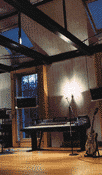 |
' | "With 'Unsound Methods', I ran everything live right up until, and throughout, the mixing process," Alan reveals. "In fact, almost nothing was committed to multitrack, so I could always have the flexibility to restructure a song at any stage. I never close the lid on anything. I normally start with some kind of rhythm groove and maybe a sequencer or string part. From there I try to think of a concept to move in a particular direction - maybe I'll get a vocal sample from a film as a guide. | ' | ||||||||||||||||||||||||||
| Then, once I have an idea to base things on, I can bring in other sounds and textures. There's a track called 'Red River Cargo' which is about the '60s' civil rights movement in the American southern states. As soon as I had that idea, it immediately conjured up all sorts of sounds that evoke that time and place - swamp sounds, oppressive weather, gospel singers, dogs barking - and that's when the track started to develop. Those moments are particularly exciting. I'm not sure you ever surpass them." | |||||||||||||||||||||||||||||
| So
how is the whole lot put together?
|
|||||||||||||||||||||||||||||
| "
I use Steinberg Cubase with a Mac, although I could start slagging off
Steinberg now. I invested in the latest version, VST, with the hard disk
to record vocals. It worked great for a while but as soon as I started
to run it with a mixing console, it wouldn't stay in sync and I wasted
a week of studio time finding out why. I had to go back a version, to Audio
XT, and that's what I finished the project with. Perhaps Steinberg would
like to refund my week's studio costs?
I'm in a situation now where my studio is a fantastic working environment but I don't quite have the technology to finish a project. I need to have most of my EQs and effects software-based. I also need to be able to do almost everything on the computer, along with some quality outboard gear, valve amps, compressors and so on. I've been the guinea pig for so many pieces of
software. People that I respect have said to me 'the best thing to do is
stay one year behind the technology,' and that's good advice. Every time
I try using the cutting-edge stuff, because the potential is so enticing,
I come unstuck. Most software manufacturers need a serious user before
they can eliminate all the faults; bench testing's not enough. I've been
stung so many times that I'm already researching now, well ahead of my
next project, so that it doesn't happen again."
|
|||||||||||||||||||||||||||||
| Being
your own boss
After all these years, Alan has still retained
enthusiasm for making music. And doing it on his own helps.
|
|||||||||||||||||||||||||||||
| ' | "I love making records on my own terms," he agrees. "I like working with other people at appropriate times, but I don't want to be involved in partnerships or groups. I don't need the aggravation anymore. I'm probably more enthusiastic than I've ever been and now I'm in the position to do whatever I want. It's an idyllic situation and I'm very grateful for the years Depeche gave me to put me in this situation." | ' | 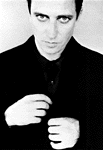 |
||||||||||||||||||||||||||
| What of the future? What if the new album is not picked up by thousands of Depeche Mode fans? | |||||||||||||||||||||||||||||
| "I don't have any expectations. I take care over every aspect and from that point of view I want it to be as strong as possible. I want it to be grown up and adult, and I'd like people that I respect to say they like it. In terms of selling records, if it happens, it happens. It's not going to make any real difference, but if you put any kind of work in, it's nice to get some kind of reward back." | |||||||||||||||||||||||||||||
| Alan Wilder on gear | |||||||||||||||||||||||||||||
| ON SAMPLING | |||||||||||||||||||||||||||||
|
ON SYNTHS
|
|||||||||||||||||||||||||||||
| ' |
|
' | ' |
|
|||||||||||||||||||||||||
| ON PHYSICAL MODELLING SYNTHS |
ON HIS FAVOURITE DEVELOPMENT
|
||||||||||||||||||||||||||||
| ' |
|
' | ' |
|
|||||||||||||||||||||||||
| ON SAMPLING OTHER PEOPLE | |||||||||||||||||||||||||||||
| "It's still a grey area. If someone uses something of mine, and uses it cleverly and creatively, then I'm flattered and don't really mind. However, if they take a huge chunk, reproduce it identically, and then call it theirs, then that's a different matter. But I'd be hypocritical to complain about sampling. If you use something as a source sound which you then manipulate into something essentially new, to me that's perfectly acceptable and creative." | |||||||||||||||||||||||||||||
| Fifteen
years of making music
Do you ever go back to old things that you've done either with Depeche Mode or Recoil? |
|||||||||||||||||||||||||||||
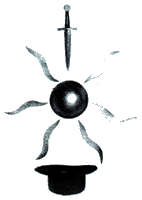 |
"It's healthy to look back at what you've done and see ways in which it could be improved. I have trouble in listening to stuff I've done in the past and enjoying it although there are the odd things." What are those? "'Faith Healer' from the last Recoil album is something I enjoy, along with 'Edge To Life' (from the same album). There are tracks from Depeche albums I still enjoy. 'In You Room' and 'Walking In My Shoes' still sound strong. Even going back to 'Violator', it sounds thin and polite over what I'd do now but I still think it's strong stuff." | ||||||||||||||||||||||||||||
| Can you see a progression in your sound all the way through? | |||||||||||||||||||||||||||||
| "There would be some serious problems if I wasn't moving on and learning from past experiences. I think that certainly the years working on Depeche Mode stuff with all the people we worked with - Dan Miller on the early stuff to people like Flood and Gareth Jones - has all been and invaluable learning experience and has left me with a strong idea of how to put the overall picture together." | |||||||||||||||||||||||||||||